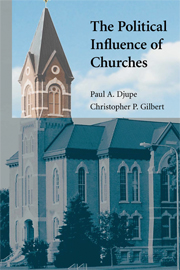Book contents
- Frontmatter
- Contents
- Acknowledgments
- Introduction: A Theory of Religious Influence on Political Behavior
- 1 Social Networks and Church Structure
- 2 Clergy Influences and Religious Commitment Reconsidered
- 3 Church-Centered Influences on Public Opinion
- 4 The Resourceful Believer
- 5 The Construction of Political Mobilization in Churches
- 6 Present but Not Accounted for?
- 7 Conclusion
- Appendix: Variable Coding
- References
- Index
2 - Clergy Influences and Religious Commitment Reconsidered
Reconciling Old and New Influences on Political Behavior
Published online by Cambridge University Press: 05 June 2012
- Frontmatter
- Contents
- Acknowledgments
- Introduction: A Theory of Religious Influence on Political Behavior
- 1 Social Networks and Church Structure
- 2 Clergy Influences and Religious Commitment Reconsidered
- 3 Church-Centered Influences on Public Opinion
- 4 The Resourceful Believer
- 5 The Construction of Political Mobilization in Churches
- 6 Present but Not Accounted for?
- 7 Conclusion
- Appendix: Variable Coding
- References
- Index
Summary
chapter 1 has laid out an argument, with considerable empirical support, for the salience of social networks within congregations as crucial factors affecting the political activities and beliefs of church members. The specification of church-centered formal and informal social networks through the questions posed in our congregational study represents a significant advancement in how social scientists comprehend and measure the political influence of church and, by extension, how political influence in other types of social organizations may be evaluated. But as we argued in the Introduction, social networks are just one component of the complete picture, albeit an essential one. Moreover, our theoretical framework does not merely assert that aspects of social networks should simply be incorporated into existing explanatory models of church member political behavior. Rather, we argue that the five sets of factors outlined in the Introduction work in concert to affect what church members think and do in the political realm. This assertion necessitates a reinterpretation of how all potential explanatory factors influence congregant political behavior, particularly in light of the strong initial evidence supporting the salience of social networks.
The two explanatory factors most in need of reinterpretation are clergy influences and religious commitment, and this chapter offers an examination of the nature – more specifically, the circumscribed nature – of the influence each factor exerts on church member political behavior.
- Type
- Chapter
- Information
- The Political Influence of Churches , pp. 58 - 89Publisher: Cambridge University PressPrint publication year: 2008



